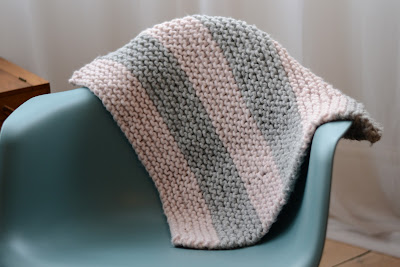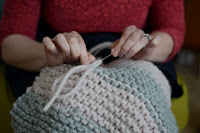So its only taken about 3 months but I have finally completed my first knitting project. Hurrah. A chunky knit pink and grey blanket for my God daughter Amelie.
 |
| wrapped up and ready to go. |
Its not perfect (sorry Amelie I did try my best) I did drop a stitch and something odd happened half way through when I added a colour and took a bit of bad advice through You Tube. However as its my first attempt and I'm self taught I am pretty pleased with the results and am already thinking about what to make next.
Apart from a fun night out at a knitting circle where I learnt how to cast on (whilst drinking several cocktails, so it's a bit of a blur) everything else was self taught, so if you are thinking about knitting but not sure where to start here is my idiots beginners guide... go on do it.
1. Think big
You need to match your wool and needle by size. The right size needle for the wool is written on the packaging of the wool, this took me a while (and a great deal of faffing around in John Lewis) to work out. And when thinking about size my advice is to think big, big needles and big wool. Creating a chunky knit item you will see results much quicker which is much more satifiing especially when you are just starting out. I worked with a pair of 12mm needles and SMC select wool.
2. Get over the idea that this is going to be cheap.
Wool is not cheap (well nice, soft, chunky wool is not cheap) so don't get into this if you are thinking that by hand making something it will cheaper then something you can buy at the shops. I bought my Wool at John Lewis as they had a really wide selection and I knew if I ran out it would be really easy to get more. I hope that once I find the wool that really works for me I can find somewhere cheaper online, i'll let you know if I do.
3. Have a little one on the side.

Whilst I was experimenting with techniques and adding extra colours I had a s set of small needles and a small strip of cheap wool on the go. It just gives you something to practice on without getting precious about ruining it. I didn't always take my own advice on this point but wish I had.
4. Little and often
In my experience when starting out it's quite easy to forget what you are doing and get into the rhythm. Maybe its just me but if I leave it more then 4 or 5 days I forget how to stitch or cast on and need to use my practice knitting strip to remind me. So I recommend doing just a little bit every few days, even if its just One or Two Lines, and hopefully after a few projects the important stuff will be etched on the brain.
5. You Tube
You Tube was really helpful and is where I learnt most of the basic skills BUT a few words of warning...
At the start of most videos the knitter feels the need to give you a vast amount of unnecessary chat, you just need to get through this by scrolling along until it gets interesting or shout at your lap top, come on just stitch bitch, that helped me through these dull moments.
They all seem to think that the way you hold your working wool (yarn) is of great importance and proceed to show you a really complex method of wrapping it round your fingers. I ignored this, just make sure you have control of the yarn, you will soon work out what is comfortable for you.
Don't listen to the cheats! There are a few videos showing you a quick way round things, don't listen! Every time I tired 'a cheat' my project took a turn for the worst. Knitting has been a around for a long time so I think the method is pretty well tired and tested, plus if you are going to the effort to knit a handmade item why bother taking a short cut.
There is a lot of rubbish out there and you do need to take some time to find a good, clear demo, luckily I have rounded up a good selection below...
Casting on
Judy here uses a standard knot to tie the wool to the needle, I learnt to cast on using a slip knot for the knot onto the needle. Just search Slip Knot on you tube and there are many demos but you can just do a simple knot, if it's good enough for Judy!
Knitting - The main bit
Warning, this women doesn't get to the interesting bit until about 1.20 into the video.
Casting off
Adding in a new colour
Weaving in the ends
If you have added colour through your project, or added in a new ball of wool you will need to weave in the ends, for this you need to big a needle that matches the size of your wool. I thought this was going to be really tricky buts its actually simple and easy to active a neat look.























































